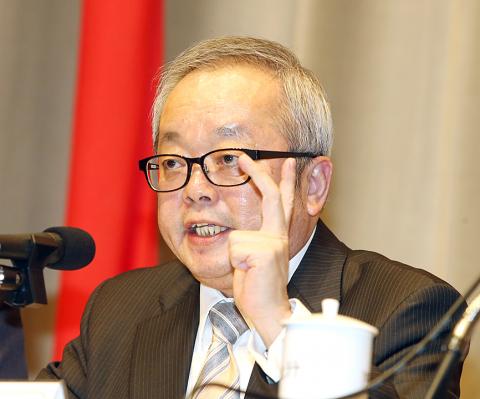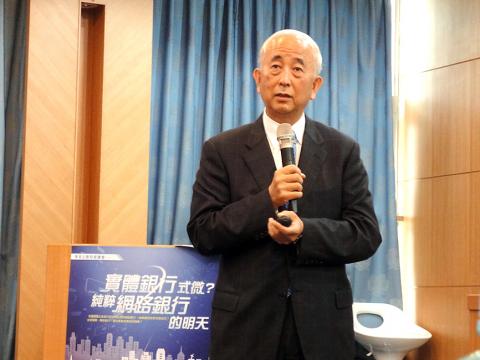State-run banks could lose up to NT$20.1 billion (US$665.97 million) for extending a loan to troubled Ching Fu Shipbuilding Co (慶富造船), the Cabinet said yesterday, adding that First Commercial Bank chairman Tsai Ching-nain (蔡慶年), who supervised the syndicated loan, would be removed.
However, there is no conclusive evidence of any political intervention in the loan decision, the Cabinet said.
Ching Fu, which was awarded a NT$35.8 billion contract to build six minesweepers for the navy as part of a domestic warship program, defaulted on a NT$20.5 billion syndicated loan, forcing nine banks to lose a combined NT$20.1 billion, an Executive Yuan report said yesterday.

Photo: CNA
The investigation revealed major dereliction of duty by the Ministry of National Defense and First Bank in awarding the contract and loan to the financially unstable company, Vice Premier Shih Jun-ji (施俊吉) said.
There were also suspicious money transfers to Ching Fu, and questionable communications between the Presidential Office and the Cabinet over the case, Shih added.
The ministry failed to ensure that Ching Fu had the financial capability to carry out the project; failed to ensure the company had the manufacturing ability; and failed to launch a negotiation process with China Fu and a potentially more qualified bidder, CSBC Corp (台船), before resorting to lots-drawing to decide the winner of the minesweeper tender, the report said.

Photo: Lu Kuan-cheng, Taipei Times
The ministry lowered the minimum asset requirement for potential bidders from NT$3.52 billion to NT$176.46 million, Minister without Portfolio Lo Ping-cheng (羅秉成) said.
It also neglected that Ching Fu had little ability to construct a shipyard for the minesweepers and awarded the project anyway, Lo said.
“Throughout the whole procurement process, the ministry gave the impression that it was biased toward Ching Fu and relaxed the rules,” Lo said.
According to the report, First Bank was also negligent in failing to ensure that Ching Fu had the financial and manufacturing ability before approving the loan.
While it required Ching Fu to complete a capital increase as part of its loan terms, the bank failed to demand an execution plan in advance, resulting in the bank’s approving an additional loan of NT$1.05 billion to help Ching Fu increase its capital.
“The bank opened its vault for Ching Fu to take the money away,” Shih said.
Tsai is to be removed due to negligence and the ministry has to report its planned disciplinary measures to the Executive Yuan, Shih said.
Meanwhile, Ching Fu transferred NT$4.93 billion of the loan money into five questionable accounts in Hong Kong, Macau and Singapore, which the company said were used to pay ship manufacturing costs, Shih said.
About NT$1.3 billion was transferred back from the overseas accounts to those of Ching Fu’s managers and subsidiaries in Taiwan, Shih said, adding that prosecutors are to investigate suspected money laundering or other illegal activities.
The Presidential Office on Sept. 1, 2015, under then-president Ma Ying-jeou (馬英九), issued a document to the Executive Yuan which included a letter by Ching Fu petitioning the government to assist the company in securing loans, the report said.
Former Executive Yuan secretary-general Chien Tai-lang (簡太郎) then convened two meetings with the banks to discuss the loan case in September and December that year, but Tsai said he was not under pressure to have First Bank lead the loan, Shih said.
“Although the investigation reveals [the actions of the Presidential Office and the Executive Yuan], it does not mean that we have determined there was interference by senior officials,” Shih said.
The Cabinet began the investigation on Oct. 17 and is to transfer the case to the judiciary for further investigation.
Meanwhile, President Tsai Ing-wen (蔡英文) yesterday said in the Solomon Islands that whether the government should transfer the minesweeper project to another shipbuilder or abort the project to upgrade the existing fleet depends on the navy’s evaluation.
“It has to be a professional decision rather than a political one,” she said.
Additional reporting by Chung Li-hua

Nvidia Corp yesterday unveiled its new high-speed interconnect technology, NVLink Fusion, with Taiwanese application-specific IC (ASIC) designers Alchip Technologies Ltd (世芯) and MediaTek Inc (聯發科) among the first to adopt the technology to help build semi-custom artificial intelligence (AI) infrastructure for hyperscalers. Nvidia has opened its technology to outside users, as hyperscalers and cloud service providers are building their own cost-effective AI chips, or accelerators, used in AI servers by leveraging ASIC firms’ designing capabilities to reduce their dependence on Nvidia. Previously, NVLink technology was only available for Nvidia’s own AI platform. “NVLink Fusion opens Nvidia’s AI platform and rich ecosystem for

WARNING: From Jan. 1 last year to the end of last month, 89 Taiwanese have gone missing or been detained in China, the MAC said, urging people to carefully consider travel to China Lax enforcement had made virtually moot regulations banning civil servants from making unauthorized visits to China, the Control Yuan said yesterday. Several agencies allowed personnel to travel to China after they submitted explanations for the trip written using artificial intelligence or provided no reason at all, the Control Yuan said in a statement, following an investigation headed by Control Yuan member Lin Wen-cheng (林文程). The probe identified 318 civil servants who traveled to China without permission in the past 10 years, but the true number could be close to 1,000, the Control Yuan said. The public employees investigated were not engaged in national

ALL TOGETHER: Only by including Taiwan can the WHA fully exemplify its commitment to ‘One World for Health,’ the representative offices of eight nations in Taiwan said The representative offices in Taiwan of eight nations yesterday issued a joint statement reiterating their support for Taiwan’s meaningful engagement with the WHO and for Taipei’s participation as an observer at the World Health Assembly (WHA). The joint statement came as Taiwan has not received an invitation to this year’s WHA, which started yesterday and runs until Tuesday next week. This year’s meeting of the decisionmaking body of the WHO in Geneva, Switzerland, would be the ninth consecutive year Taiwan has been excluded. The eight offices, which reaffirmed their support for Taiwan, are the British Office Taipei, the Australian Office Taipei, the

CAUSE AND EFFECT: China’s policies prompted the US to increase its presence in the Indo-Pacific, and Beijing should consider if this outcome is in its best interests, Lai said China has been escalating its military and political pressure on Taiwan for many years, but should reflect on this strategy and think about what is really in its best interest, President William Lai (賴清德) said. Lai made the remark in a YouTube interview with Mindi World News that was broadcast on Saturday, ahead of the first anniversary of his presidential inauguration tomorrow. The US has clearly stated that China is its biggest challenge and threat, with US President Donald Trump and US Secretary of Defense Pete Hegseth repeatedly saying that the US should increase its forces in the Indo-Pacific region